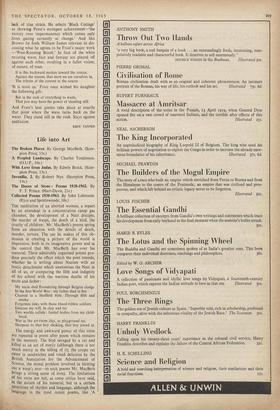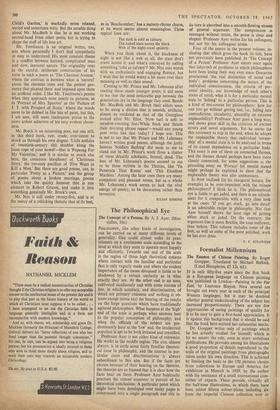Life into Art
A Peopled Landscape. By Charles Tomlinson. (O.U.P., 16s.) Collected Poems 1930-1963. By John Lehmann. (Eyre.and Spottiswoode, 18s.) THE meditation of an aborted woman, a report by an attendant in a concentration camp gas chamber, the development of a Nazi disciple, the murder of wasps, the death of a bird, the cruelty of children : Mr. MacBeth's poems spring from an obsession with the details of death, murder, torture. The use he makes of this ob- session in creating a picture of the world is impressive, both in its imaginative power and in the control that Mr. MacBeth has over his material. These admirably Organised poems pro- duce precisely the effect which the poet intends, whether he is writing about Nazism with an ironic detachment which anatomises the Nazi in all of us, or .comparing the filth and indignity of his school with the wartime deaths of his uncle and father : My uncle died floundering through Belgian sludge In the first World War: my father died in fire' Charred in a Sheffield blitz. Through filth and
smoke Forgotten links with those blood-ridden soldiers Educate my will. In clay and tar Two worlds collide: fouled bodies from my child- hood,
War as the art-room clay; as playground tar, Sharpens to that boy choking, that boy jeered at.
The energy and awkward power of this verse are repeated in poem after poem which remains in the memory. The bird savaged by a cat and killed as an act of mercy (although there is not much mercy in the telling of it), the coypu rat eaten in sandwiches and voted delicious by the British. Association for the Advancement of Science, the moral problem involved in blotting out a wasp's nest—to such poems Mr. MacBeth brings a strong sense of irony. The , limitations of his verse are not, as some critics have said, in the nature of his material but in a certain monotony of rhythm and language, although the language in the most recent poems, like 'A
Child's Garden,' is markedly more relaxed, varied and sometimes witty. But the notable thing about Mr. MacBeth is that he is not working second-hand from other poets, but is trying to shape the stuff of life into art.
Mr. Tomlinson is an original writer, too, one whom personally I don't find sympathetic or easy to understand. His most constant theme is a conflict between hurried, complicated man and slow, innocent nature. The originality rests in the careful, deliberate construction of his verse in such a poem as `The Chestnut Avenue,' where the contrast is between what is `natural' about the chestnut trees and 'the patient geo- metry that planted them' and imposed upon them an artificial order. I like Mr. Tomlinson's poems when they approach most nearly to pictures, as in 'Portrait of Mrs. Spaxton' or the 'Picture of J. T. with Prospect of Stone,' where the words seem to be dabbed in like bits of paint, but this, I am sure, will seem inadequate praise to the more ardent admirers of his very evident clever- ness.
Mr. Brock is an interesting poet, but one still, in this third book, raw, crude, over-intent to shock us through his own disgust. 'Little nodules of twentieth-century shit shudder along the loose rope of. your bowel'—that is `Popsong For My Valentine,' and it is similar to much else here, the conscious blasphemy of 'Christmas Story,' the too-easy pacifism of 'Five Ways to Kill a Man.' But there are good poems, too, in particular `Pretty as a Picture,' and the group of poems about a broken marriage, poems which take the quirky humour that is one element in Robert Graves, and make it into something genuinely Mr. Brock's own.
Mr. Nye is still under twenty-five, and is at the mercy of a rollicking rhetoric that at its best,
as in `Beachcomber,' has a nursery-rhyme charm, at its worst seems almost meaningless. Three typical lines are:
The dark is cold as calvary. The naked stars across the black Web of the night crawl spiderly.
When you think about it, the blackness of night is not like a web at all, the stars don't crawl across it, and what's conveyed by calling something 'cold as calvary'? Mr. Nye uses words with an enthusiastic and engaging fluency, but I wish that he would worry a bit more over their meaning as well as their sound.
Coming to Mr. Prince and Mr. Lehmann after reading these much younger poets, it did seem to me that the most noticeable gap between the generations lay in the language they used. Beside Mr. MacBeth and Mr. Brock their elders seem to be using a diction that is smooth, artificial, almost as outdated as that of the Georgians looked after Mr. Eliot. 'Now turf is soft to meadow-roaming feet/While finch and thrush their morning phrase repeat'—would any young poet write like that today? I hope not. This is not to say that Mr. Prince and Mr. Lehmann haven't written good poems, although the justly famous 'Soldiers Bathing' did seem to me to stand out in Mr. Prince's work from a clutter of verse drearily scholastic, formal, dead. The best of Mr. Lehmann's poems seemed to me to be those written in the Thirties, like 'To Penetrate That Room' and 'This Excellent Machine.' Among the later ones there are many competent and pleasant verses, but as a whole Mr. Lehmann's work seems to lack the vital energy of poetry, to be decoration rather than invention.
JULIAN SYMONS



































 Previous page
Previous page